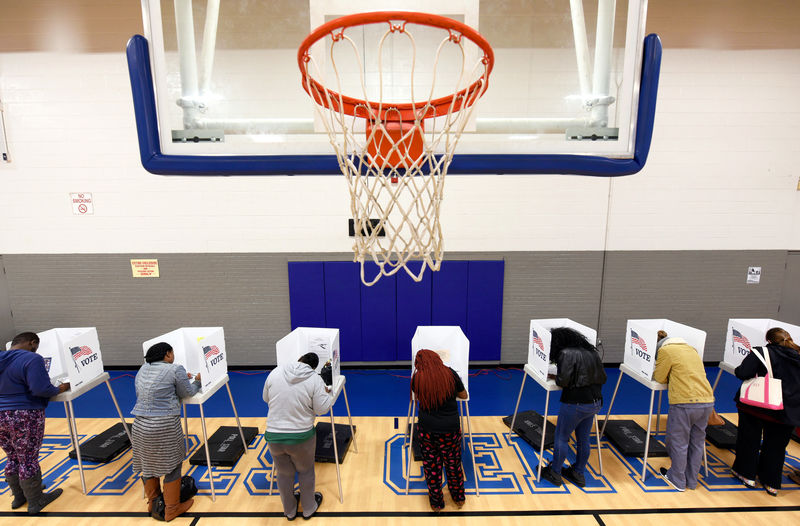By Lawrence Hurley
WASHINGTON (Reuters) - The U.S. Supreme Court on Monday rebuffed a Republican bid to revive a strict North Carolina voter-identification law that a lower court found deliberately discriminated against black voters, handing a victory to Democrats and civil rights groups.
The justices' decision not to take up a Republican appeal in the important voting rights dispute set no legal precedent and did not rule out the possibility that the court, with a 5-4 conservative majority, would endorse such laws in future. North Carolina's law was one of a number of similar statutes passed by Republican-controlled states.
"Today's announcement is good news for North Carolina voters. We need to be making it easier to vote, not harder," said North Carolina Governor Roy Cooper, a Democrat who took office in January and asked the court not to take up the case.
The justices left in place a July 2016 ruling by the Richmond, Virginia-based 4th U.S. Circuit Court of Appeals that voided the law passed by a Republican-controlled legislature and signed by a Republican governor.
The appeals court found that the law's provisions "target African-Americans with almost surgical precision" and "impose cures for problems that did not exist," concluding that the Republican-led legislature enacted it "with discriminatory intent."
Republicans have said laws like the one in North Carolina are needed to prevent voter fraud. Democrats have said such laws are voter suppression measures intended to make it harder for groups that tend to back Democratic candidates, including black and Hispanic voters, to cast ballots.
The North Carolina law required that certain forms of government-issued photo identification cards be presented by voters, for example allowing driver's licenses, passports and military identification cards but not public assistance cards used disproportionately by minorities. Other provisions included cutting early voting days and ending same-day voter registration.
The Supreme Court could yet be asked to review a similar Texas law now under challenge in lower courts. In April, a federal judge ruled that the law was enacted with the intent to discriminate against black and Hispanic voters.
Chief Justice John Roberts wrote a two-page statement indicating the move not to hear the North Carolina case should not be interpreted as saying anything about the merits of the statute. Roberts said one reason for rejecting the case was a "blizzard of filings over who is and who is not authorized to seek review in this court under North Carolina law."
The court typically does not explain its reasoning behind rejecting a case.
'STRONG MESSAGE'
Civil rights groups hailed Monday's action.
"We are grateful that the Supreme Court has decided to allow the 4th Circuit's ruling to stand, confirming that discrimination has no place in our democracy and elections. This ruling sends a strong message that lawmakers in North Carolina should stop enacting laws that discriminate based on race," said Allison Riggs, a lawyer with the Southern Coalition for Social Justice, one of the groups that challenged the law.
Governor Cooper and North Carolina's Democratic attorney general, Josh Stein, had told the justices they wanted to drop the state's appeal of the 4th Circuit ruling. But the Republican-led state legislature said it should be able to intervene to defend the law. The appeal was filed by Cooper's predecessor, Republican Pat McCrory.
"In light of Chief Justice Roberts' statement that the ruling was not based on the merits of voter ID, all North Carolinians can rest assured that Republican legislators will continue fighting to protect the integrity of our elections by implementing the commonsense requirement to show a photo ID when we vote," North Carolina Senate leader Phil Berger and House of Representatives Speaker Tim Moore, Republicans who backed the law, said in a joint statement.
Myrna Perez, a lawyer at the liberal-leaning Brennan Center for Justice at New York University School of Law that has challenged the Texas law, said the Supreme Court is likely to take up that case or a similar dispute from Wisconsin.
In the meantime, Republican state lawmakers remain eager to enact new voter restrictions. Four states -- Iowa, Arkansas, North Dakota and Indiana -- have passed such measures this year alone, according to the Brennan Center.
Perez said "there is a bullishness from legislators" about imposing voter restrictions, with Republican President Donald Trump's administration backing conservative allegations of widespread voter fraud and conservative Justice Neil Gorusch recently appointed by Trump to the court to restore its conservative majority.
Civil rights groups, including the National Association for the Advancement of Colored People (NAACP), and individual voters sued to block North Carolina's statute, saying it violated the U.S. Constitution's guarantee of equal protection under the law and provisions of a civil rights law called the Voting Rights Act.

North Carolina passed the law weeks after the Supreme Court ruled in 2013 to eliminate a requirement that states with a history of discrimination receive federal approval before changing election laws.